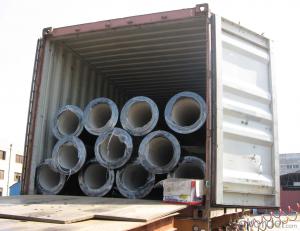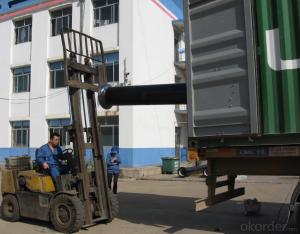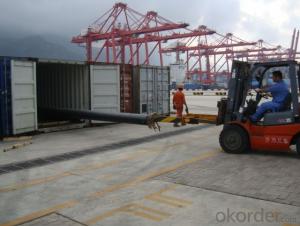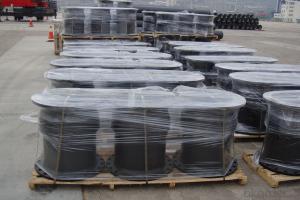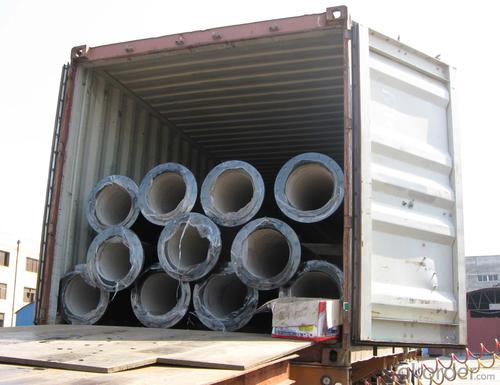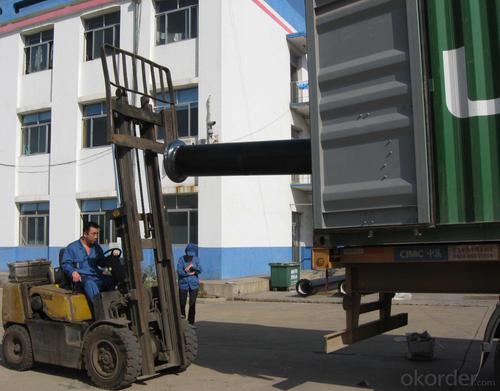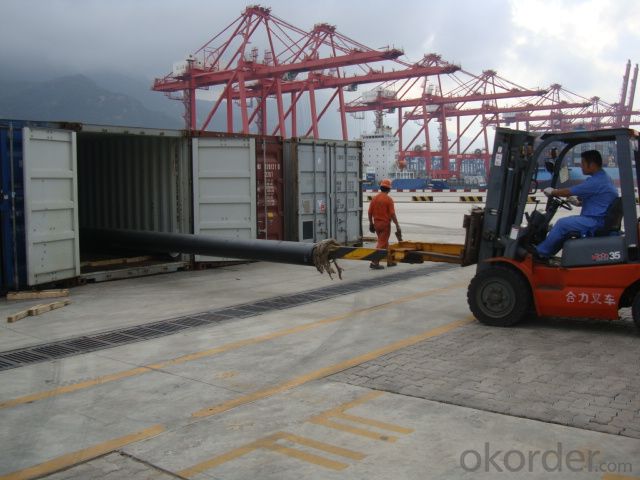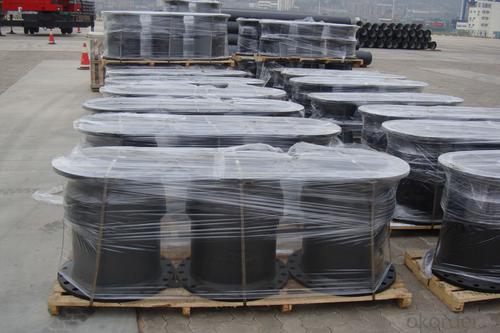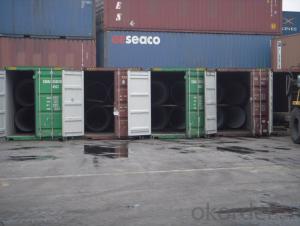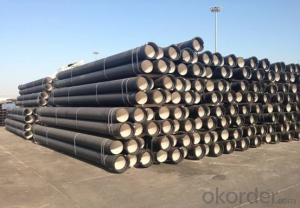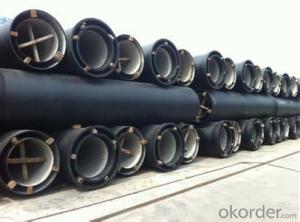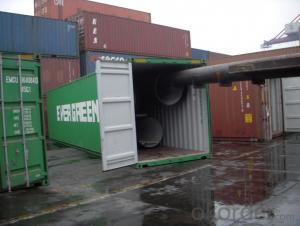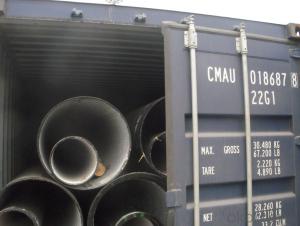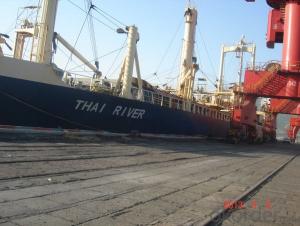DUCTILE IRON PIPES C Class DN600
- Loading Port:
- China Main Port
- Payment Terms:
- TT OR LC
- Min Order Qty:
- -
- Supply Capability:
- -
OKorder Service Pledge
OKorder Financial Service
You Might Also Like
Ductile Iron Cast Pipe is without any defects compare with tradition casting tech, which has many advantages particularly as follow:
(1) High density. In the "vertical upward casting" process, the melt iron of centre liquid column in center crystallizer is continuously feeding for volume shrinkage caused by condensation tube at outer circumference , which lead to be free of shrinkage porosity.
(2) High purity. When melt iron pouring, the mixed impurities such as gas, dross, sand grain which are lighter than melt iron could be eliminated at furnace mouth, its impossible to enter into the crystallizer through the channel, so the melt iron into the crystallizer is very pure.
(3) Strength with toughness. The cooling speed provided by continuous crystallizer is 30 times than sand casting and 5 times than centrifugal casting, and doesn't produce white iron, the eutectic cell volume of continuous cast iron is one eighth to one tenth compare with traditional cast iron. The density of graphite nodule in ductile iron can reach 300-700 pcs/mm2. Therefore, all reason above improve the strength and toughness of continuous cast iron.
(4) Free machining. The high speed cooling make the hardening phase (such as boride, steadite) not appear like reticular, massive or thick, but diffuse like fish bone and pane in shape, moreover, there are tiny graphite flakes inlaid hardening phase. It's free machining in BrinellHardness the range of 250-300HB. However, the Brinell Hardness of 250 is top limit to common metal materials.
(5) Uniform composition of tube wall. The convection mixing of liquid column caused by marching type drawing in crystallizer make the composition of tube wall well-distributed, and concentration gradient very little.
(6) High productivity. To the wall thickness of tube under 10mm, the speed of continuous casting is 1 meter/min, to the wall thickness of tube under 20mm, the speed of continuous casting is 0.5 meter/min, which is high efficiency that centrifugal or other casting tech couldn't reach.
- Q: Are ductile iron pipes suitable for installation in areas with high groundwater salinity?
- Ductile iron pipes are generally suitable for installation in areas with high groundwater salinity. Ductile iron is known for its corrosion resistance, making it a preferred choice for various applications, including water and wastewater systems. High groundwater salinity refers to an increased presence of dissolved salts in the water. While this can potentially cause corrosion in certain materials, ductile iron pipes are designed to withstand such conditions. Ductile iron pipes have a protective lining, typically made of cement mortar or polyurethane, which acts as a barrier between the pipe and the surrounding environment, including high salinity water. The lining helps to prevent any corrosive effects of the high groundwater salinity on the iron pipe, ensuring its long-term durability and reliability. Additionally, ductile iron pipes have a high tensile strength, allowing them to withstand external loads and pressure, even in challenging environments. It is important to note that the suitability of ductile iron pipes for areas with high groundwater salinity can also depend on factors such as the specific levels of salinity, the presence of other corrosive agents, and the overall design and installation practices. Therefore, it is recommended to consult with experts or engineers familiar with the local conditions to determine the most appropriate materials and precautions for specific installation projects.
- Q: Are ductile iron pipes suitable for horizontal directional drilling (HDD) installations?
- Yes, ductile iron pipes are suitable for horizontal directional drilling (HDD) installations. They possess the necessary strength and flexibility to withstand the drilling process and can be easily installed underground without compromising their structural integrity.
- Q: What is the expected buoyancy of ductile iron pipes?
- The expected buoyancy of ductile iron pipes can vary depending on several factors such as the diameter, wall thickness, and the specific gravity of the fluid being transported. However, in general, ductile iron pipes are known for their relatively low buoyancy compared to other materials like plastic or concrete. Due to their higher density and weight, ductile iron pipes tend to have a greater resistance to buoyancy forces. This makes them suitable for applications where buoyancy is a concern, such as water and wastewater transmission systems. The combination of their inherent strength and weight helps to keep the pipes grounded and prevents them from floating or rising to the surface. It is important to note that even though ductile iron pipes have lower buoyancy compared to other materials, they may still experience some level of buoyancy in certain scenarios, especially when the fluid being transported has a lower specific gravity. To mitigate this potential issue, additional measures such as anchoring or ballasting may be employed to ensure the stability and integrity of the pipeline system. Overall, while the expected buoyancy of ductile iron pipes is generally low, it is crucial to consider the specific conditions and requirements of the project to determine the most appropriate pipe material and design for optimal performance and safety.
- Q: Can ductile iron pipes be used for underground slurry pipelines?
- Yes, ductile iron pipes can be used for underground slurry pipelines. Ductile iron pipes are known for their strength and durability, making them suitable for transporting various types of slurries underground.
- Q: Are ductile iron pipes resistant to seismic events?
- Generally, ductile iron pipes exhibit resistance to seismic events. Ductile iron, a form of cast iron known for its strength and durability, can withstand external forces, including those induced by seismic events like earthquakes. The design of ductile iron pipes allows for flexibility, enabling them to absorb and dissipate energy from seismic waves. This flexibility ensures the pipes remain intact despite ground movements and vibrations, preventing any breakage or cracking. Moreover, the joints of these pipes are designed to offer some level of flexibility, further enhancing their ability to withstand seismic events. Furthermore, the construction of ductile iron pipes involves thick walls, providing them with exceptional structural integrity. This strength reduces their susceptibility to damage during seismic events and ensures a consistent flow of fluids, such as water, even in extreme conditions. Nonetheless, it is crucial to recognize that the resistance of ductile iron pipes to seismic events can depend on various factors. These factors include the magnitude and proximity of the earthquake, the quality of installation and maintenance, and the specific design considerations for the pipeline system. Consequently, it is vital to adhere to proper engineering and construction practices to optimize the resilience of ductile iron pipes in areas prone to seismic activity.
- Q: What is the expected fatigue life of ductile iron pipes under cyclic loading?
- The fatigue life of ductile iron pipes under cyclic loading can vary due to factors such as the magnitude and frequency of the loading, material quality, pipe design and installation, and environmental conditions. Ductile iron possesses high strength and ductility, enabling it to withstand cyclic loading to a certain extent. However, like any material, it is susceptible to fatigue failure over time. Engineers commonly employ fatigue analysis and testing methods to estimate the expected fatigue life of ductile iron pipes. These methods involve subjecting representative samples of the pipes to controlled cyclic loading and determining the number of cycles required for failure. The results of these tests can then be used to extrapolate the expected fatigue life of the pipes under similar loading conditions. It is important to note that the expected fatigue life can significantly differ depending on the specific conditions and loading patterns experienced by the pipes in a given application. Therefore, it is crucial to consider operational demands, maintenance practices, and the overall structural integrity of the pipeline system. Additionally, adhering to appropriate design standards and guidelines, along with regular inspection and maintenance, can help enhance the fatigue life of ductile iron pipes. In conclusion, while providing a specific value for the expected fatigue life of ductile iron pipes under cyclic loading is challenging, engineers can estimate it through fatigue analysis and testing methods. Considering various factors and maintaining the pipes properly is essential to ensure their longevity and prevent potential failures.
- Q: What is the maximum temperature that ductile iron pipe can handle?
- The ability of ductile iron pipe to withstand high temperatures varies depending on factors such as the grade of ductile iron, the length of time exposed to heat, and the presence of external factors like corrosive environments. In general, ductile iron pipes can tolerate temperatures up to 400-450 degrees Fahrenheit (204-232 degrees Celsius) for short periods. However, it is crucial to refer to the manufacturer's specifications and guidelines to determine the exact maximum temperature limits for a specific grade of ductile iron pipe. Additionally, it is advisable to consider the consequences of thermal expansion, potential loss of mechanical properties, and any additional protective measures that may be necessary when operating at elevated temperatures.
- Q: Can ductile iron pipes be used for underground drainage systems?
- Indeed, underground drainage systems can utilize ductile iron pipes. Ductile iron, being a robust and enduring substance, exhibits resistance to corrosion, rendering it appropriate for subterranean applications. Possessing remarkable tensile strength, it can endure substantial loads and pressures, thereby making it an excellent choice for drainage systems that encounter significant flow rates or necessitate substantial burial depths. Moreover, ductile iron pipes boast an extended lifespan, thereby decreasing the requirement for frequent maintenance or replacement. All in all, ductile iron pipes prove to be an unwavering and efficient option for underground drainage systems.
- Q: How are ductile iron pipes different from other types of pipes?
- DI pipes, also called ductile iron pipes, possess unique properties and are manufactured differently from other pipe types. They are specifically designed to withstand high-pressure systems and offer exceptional strength and durability, setting them apart from PVC, steel, or concrete pipes. One significant distinction lies in the material used. DI pipes are made from a type of cast iron containing additional elements like carbon and silicon, which give them remarkable strength and flexibility. This composition enables DI pipes to handle high-pressure systems, making them suitable for applications requiring reliable water supply, such as water mains, sewer systems, and industrial pipelines. Another distinguishing feature of DI pipes is their ability to endure external loads and pressure. They possess high tensile strength, enabling them to bear heavy loads without cracking or breaking. This property makes them ideal for underground installations, where they can withstand the weight of soil, traffic, and other external factors. Furthermore, DI pipes exhibit excellent corrosion resistance. They are coated with a protective layer, typically through cement lining, which safeguards against rust and corrosion caused by the elements, chemical reactions, or transported fluids. This corrosion resistance significantly extends the pipes' lifespan, reducing maintenance and replacement costs over time. Additionally, DI pipes offer great flexibility. They are renowned for their ductility, meaning they can deform under stress without fracturing, making them less prone to cracks and leaks. This inherent flexibility allows them to withstand ground movement and seismic activities, ensuring a safe and reliable water distribution system. Regarding installation, DI pipes are relatively easy to handle due to their lighter weight compared to materials like concrete or steel. They are also available in various lengths and diameters, making them adaptable to different project requirements. In conclusion, DI pipes distinguish themselves through their exceptional strength, resilience, corrosion resistance, and ease of installation. These properties make them the preferred choice for numerous infrastructure projects, where reliability and longevity are critical factors.
- Q: What are the typical joint restraint systems used in ductile iron pipes?
- The typical joint restraint systems used in ductile iron pipes include mechanical joint restraints, push-on joint restraints, and restrained joint systems. 1. Mechanical Joint Restraints: These systems use mechanical devices to secure the pipe joints. The most common type of mechanical joint restraint is the gland-type restraint, which consists of a gland and a follower. The gland is placed over the pipe joint and tightened using bolts, creating a tight seal and preventing movement. 2. Push-On Joint Restraints: Push-on joint restraints utilize a rubber gasket to create a watertight seal between the pipe sections. These restraints do not require any additional devices or bolts to secure the joint. The gasket creates enough friction and compression to prevent the pipe from separating. 3. Restrained Joint Systems: Restrained joint systems provide a high level of joint integrity and resistance to longitudinal movement. These systems typically use a combination of mechanical joint restraints and push-on joint restraints. They may also incorporate additional elements such as harnesses, rods, or wedges to provide extra support and prevent joint separation. It is important to note that the specific joint restraint system used in ductile iron pipes may vary depending on the application, pipe diameter, and operating conditions. The selection of the appropriate joint restraint system is crucial to ensure the structural integrity and longevity of the pipeline.
Send your message to us
DUCTILE IRON PIPES C Class DN600
- Loading Port:
- China Main Port
- Payment Terms:
- TT OR LC
- Min Order Qty:
- -
- Supply Capability:
- -
OKorder Service Pledge
OKorder Financial Service
Similar products
Hot products
Hot Searches
Related keywords
